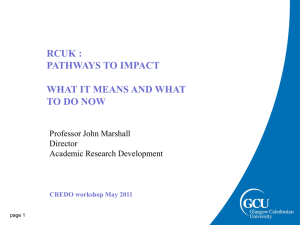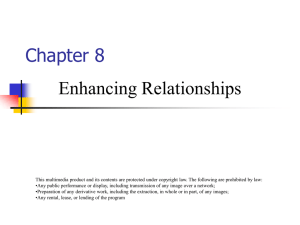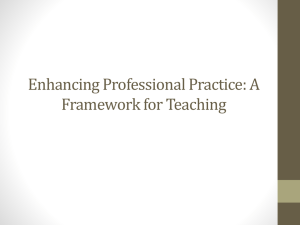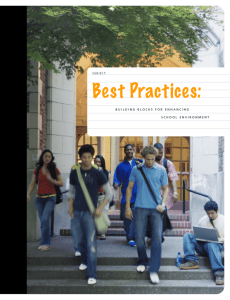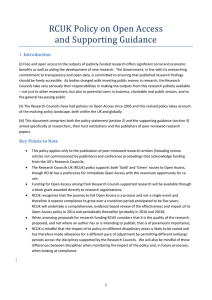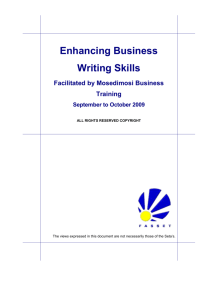Typology of Research Impacts
advertisement
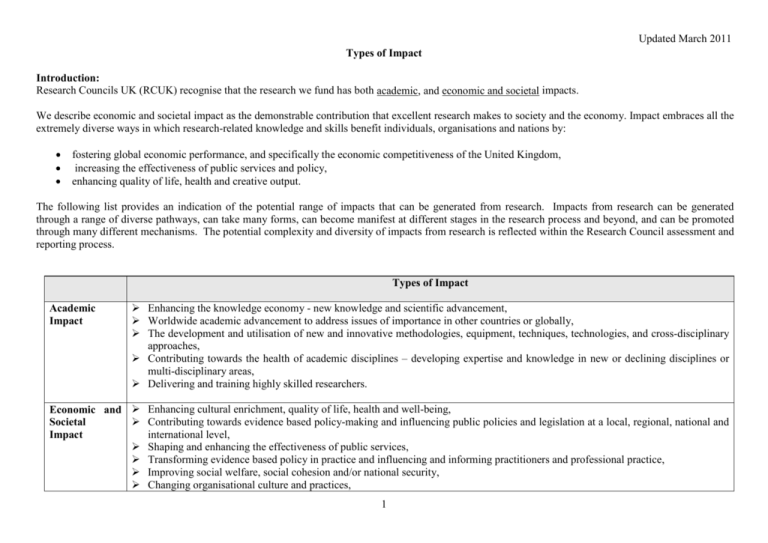
Updated March 2011 Types of Impact Introduction: Research Councils UK (RCUK) recognise that the research we fund has both academic, and economic and societal impacts. We describe economic and societal impact as the demonstrable contribution that excellent research makes to society and the economy. Impact embraces all the extremely diverse ways in which research-related knowledge and skills benefit individuals, organisations and nations by: • • • fostering global economic performance, and specifically the economic competitiveness of the United Kingdom, increasing the effectiveness of public services and policy, enhancing quality of life, health and creative output. The following list provides an indication of the potential range of impacts that can be generated from research. Impacts from research can be generated through a range of diverse pathways, can take many forms, can become manifest at different stages in the research process and beyond, and can be promoted through many different mechanisms. The potential complexity and diversity of impacts from research is reflected within the Research Council assessment and reporting process. Types of Impact Academic Impact Enhancing the knowledge economy - new knowledge and scientific advancement, Worldwide academic advancement to address issues of importance in other countries or globally, The development and utilisation of new and innovative methodologies, equipment, techniques, technologies, and cross-disciplinary approaches, Contributing towards the health of academic disciplines – developing expertise and knowledge in new or declining disciplines or multi-disciplinary areas, Delivering and training highly skilled researchers. Economic and Enhancing cultural enrichment, quality of life, health and well-being, Contributing towards evidence based policy-making and influencing public policies and legislation at a local, regional, national and Societal international level, Impact Shaping and enhancing the effectiveness of public services, Transforming evidence based policy in practice and influencing and informing practitioners and professional practice, Improving social welfare, social cohesion and/or national security, Changing organisational culture and practices, 1 Updated March 2011 Contributing toward environmental sustainability, protection and impact reduction, Enhancing the research capacity, knowledge and skills of businesses and organisations, Contributing to increasing public awareness and understanding of science, economic and societal issues, Contributing toward wealth creation and economic prosperity i.e. the creation and growth of companies and jobs; enhancing business revenue and innovative capacity, Enhancing the efficiency, performance and sustainability of businesses/organisations including public services, Attracting R&D investment from global business, Contribution to regeneration and economic development, The commercialisation and exploitation of scientific knowledge, leading to spin out companies, and the creation of new processes, products and services, Training of skilled people for non-academic professions. For examples of impact from the Research Councils: RCUK: http://www.rcuk.ac.uk/kei/Pages/home.aspx and http://www.rcuk.ac.uk/kei/maximising/Pages/ImpactPublications.aspx Arts and Humanities Research Council: http://www.ahrc.ac.uk/FundedResearch/impact/Pages/default.aspx Biotechnological and Biological Sciences Research Council: http://www.bbsrc.ac.uk/science/impact/index.html Engineering and Physical Sciences Research Council: http://www.impactworld.org.uk/ Economic and Social Research Council: http://www.esrc.ac.uk/impacts-andfindings/features-casestudies/case-studies/index.aspx Medical Research Council: http://www.mrc.ac.uk/Achievementsimpact/index.htm Natural Environment Research Council: http://www.nerc.ac.uk/using/impact/ Science and Technology Facilities Council: http://www.stfc.ac.uk/Business+and+Innovation/10618.aspx 2



